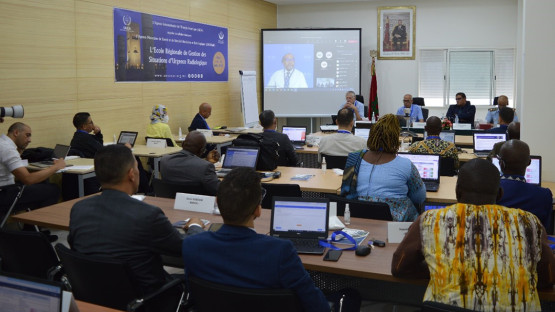Mitigating the consequences of nuclear or radiological incidents and emergencies was the focus of a recent three-week IAEA School of Radiation Emergency Management, held for the first time in French.
Nineteen nuclear professionals from francophone countries in Africa took part in the School, which concluded last month in Morocco.
“Offering this School also in French helps ensure that experts from francophone countries can easily benefit from its teachings and enhance their capacities to manage radiation emergencies as well as to develop and manage sustainable emergency preparedness and response programmes,” said Amal Elrefaei, Programme Management Officer of the IAEA’s Technical Cooperation Division for Africa.
Through lectures from IAEA and Moroccan experts and discussions on theoretical and practical subjects, such as risk assessment and planning principles, integrated response and coordination during emergencies, and field measurements and sampling methods, the participants could develop the specialised knowledge required to operate emergency management systems, act to protect people and communicate with the public in nuclear and radiological emergencies.
“In African countries, it is crucial to strengthen capacities in the management of radioactive sources to avoid environmental contamination, acute overexposure or death,” said Abdelkader Benider, Head of Radiation Safety Inspection & Responsible for Emergencies Division at the Moroccan Agency for Nuclear and Radiological Safety and Security (AMSSNuR), which jointly organized this School with the IAEA. “Radiation emergency management is a major concern for all African countries and requires trained professionals to mitigate the impact of a radiation incident or accident on first responders, the public, and the environment as much as possible.”
First launched in 2015, the School of Radiation Emergency Management is designed to help strengthen national, regional and international capacities to respond to nuclear and radiological incidents and emergencies arising from accidents, negligence or deliberate acts.
Participants are qualified professionals from organizations involved in emergency preparedness and response. Its curriculum is based on IAEA Safety Standards and guidelines.
Since its launch, 15 Schools have taken place across the globe, with two specifically hosted for African experts — in 2017 and 2018. The new French language training materials will be used in future Schools in Africa and Europe.
“The participants had the chance to exchange their expertise in the field,” said Muzna Assi, an IAEA Emergency Preparedness Officer. “During the discussions, the participants were also able to compare and contrast the procedures, command structures and division of responsibilities employed by their peers elsewhere in the region, and — with input and clarification from IAEA experts — they were able to pick out the best practices and identify gaps to fill in their national emergency response capabilities.”
In Africa, the IAEA fosters strong regional cooperation by promoting sustainability and self-reliance through collaboration with existing regional centres. AMSNuR is an IAEA Collaborating Centre in the field of nuclear security. This Centre provides a platform for supporting the IAEA’s efforts to enhance nuclear security in the region, by working to strengthen regulatory frameworks and the security of radioactive sources. In 2019 AMSNuR became the first IAEA Capacity Building Centre for Emergency Preparedness and Response (CBC-EPR) in Africa. Other similar IAEA Capacity Building Centres are located in Austria, China, France, Japan (Chiba Prefecture and Fukushima Prefecture), the Republic of Korea, Morocco, and Russia.





